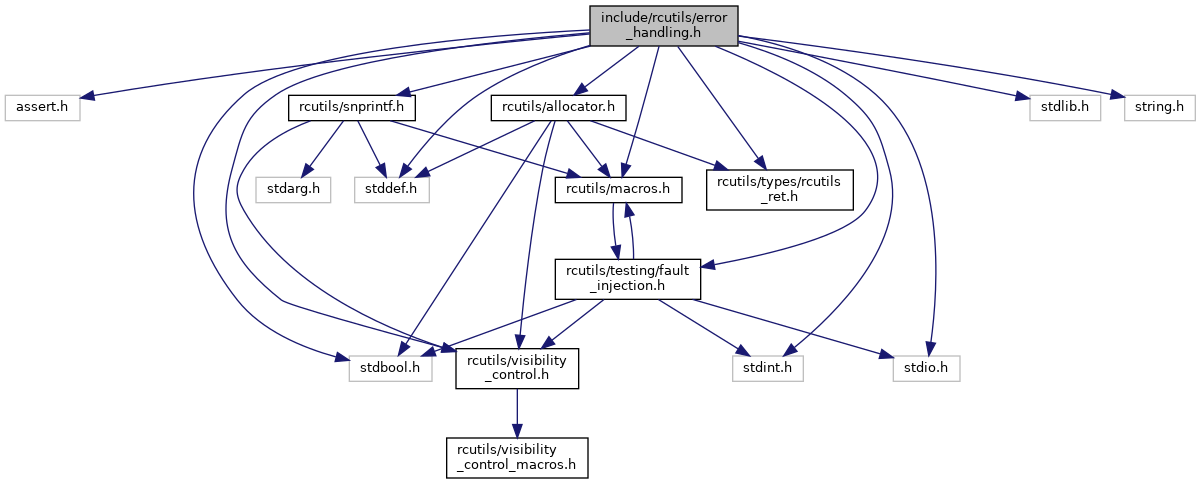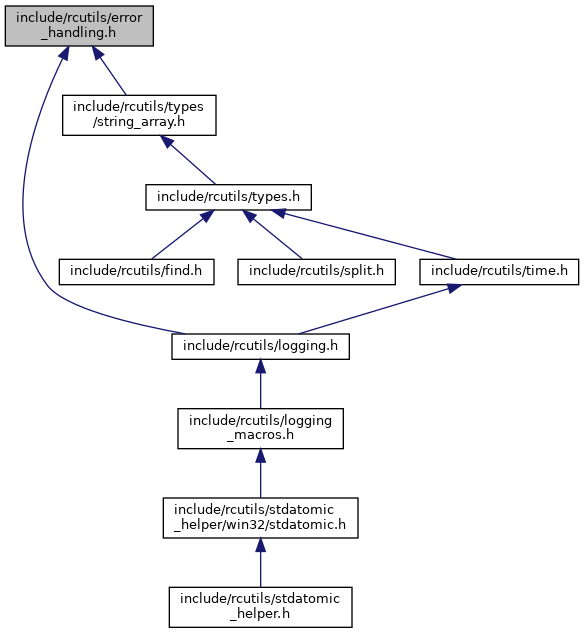#include <assert.h>#include <stdbool.h>#include <stddef.h>#include <stdint.h>#include <stdio.h>#include <stdlib.h>#include <string.h>#include "rcutils/allocator.h"#include "rcutils/macros.h"#include "rcutils/snprintf.h"#include "rcutils/testing/fault_injection.h"#include "rcutils/types/rcutils_ret.h"#include "rcutils/visibility_control.h"

Go to the source code of this file.
Classes | |
| struct | rcutils_error_string_t |
| Struct wrapping a fixed-size c string used for returning the formatted error string. More... | |
| struct | rcutils_error_state_t |
| Struct which encapsulates the error state set by RCUTILS_SET_ERROR_MSG(). More... | |
Macros | |
| #define | __STDC_WANT_LIB_EXT1__ 1 |
| #define | RCUTILS_SAFE_FWRITE_TO_STDERR(msg) do {fwrite(msg, sizeof(char), strlen(msg), stderr);} while (0) |
| #define | RCUTILS_ERROR_STATE_LINE_NUMBER_STR_MAX_LENGTH 20 |
| #define | RCUTILS_ERROR_FORMATTING_CHARACTERS 6 |
| #define | RCUTILS_ERROR_MESSAGE_MAX_LENGTH 1024 |
| #define | RCUTILS_ERROR_STATE_MESSAGE_MAX_LENGTH 768 |
| #define | RCUTILS_ERROR_STATE_FILE_MAX_LENGTH |
| #define | RCUTILS_CHECK_ARGUMENT_FOR_NULL(argument, error_return_type) |
| Check an argument for a null value. More... | |
| #define | RCUTILS_CHECK_FOR_NULL_WITH_MSG(value, msg, error_statement) |
| Check a value for null, with an error message and error statement. More... | |
| #define | RCUTILS_SET_ERROR_MSG(msg) do {rcutils_set_error_state(msg, __FILE__, __LINE__);} while (0) |
| Set the error message, as well as append the current file and line number. More... | |
| #define | RCUTILS_SET_ERROR_MSG_WITH_FORMAT_STRING(format_string, ...) |
| Set the error message using a format string and format arguments. More... | |
| #define | RCUTILS_CAN_SET_MSG_AND_RETURN_WITH_ERROR_OF(error_return_value) |
| Indicate that the function intends to set an error message and return an error value. More... | |
Typedefs | |
| typedef struct rcutils_error_string_t | rcutils_error_string_t |
| Struct wrapping a fixed-size c string used for returning the formatted error string. More... | |
| typedef struct rcutils_error_state_t | rcutils_error_state_t |
| Struct which encapsulates the error state set by RCUTILS_SET_ERROR_MSG(). More... | |
Functions | |
| rcutils_ret_t | rcutils_initialize_error_handling_thread_local_storage (rcutils_allocator_t allocator) |
| Forces initialization of thread-local storage if called in a newly created thread. More... | |
| void | rcutils_set_error_state (const char *error_string, const char *file, size_t line_number) |
| Set the error message, as well as the file and line on which it occurred. More... | |
| bool | rcutils_error_is_set (void) |
Return true if the error is set, otherwise false. More... | |
| const rcutils_error_state_t * | rcutils_get_error_state (void) |
| Return an rcutils_error_state_t which was set with rcutils_set_error_state(). More... | |
| rcutils_error_string_t | rcutils_get_error_string (void) |
Return the error message followed by , at <file>:<line> if set, else "error not set". More... | |
| void | rcutils_reset_error (void) |
| Reset the error state by clearing any previously set error state. More... | |
Macro Definition Documentation
◆ __STDC_WANT_LIB_EXT1__
| #define __STDC_WANT_LIB_EXT1__ 1 |
◆ RCUTILS_SAFE_FWRITE_TO_STDERR
| #define RCUTILS_SAFE_FWRITE_TO_STDERR | ( | msg | ) | do {fwrite(msg, sizeof(char), strlen(msg), stderr);} while (0) |
◆ RCUTILS_ERROR_STATE_LINE_NUMBER_STR_MAX_LENGTH
| #define RCUTILS_ERROR_STATE_LINE_NUMBER_STR_MAX_LENGTH 20 |
◆ RCUTILS_ERROR_FORMATTING_CHARACTERS
| #define RCUTILS_ERROR_FORMATTING_CHARACTERS 6 |
◆ RCUTILS_ERROR_MESSAGE_MAX_LENGTH
| #define RCUTILS_ERROR_MESSAGE_MAX_LENGTH 1024 |
◆ RCUTILS_ERROR_STATE_MESSAGE_MAX_LENGTH
| #define RCUTILS_ERROR_STATE_MESSAGE_MAX_LENGTH 768 |
◆ RCUTILS_ERROR_STATE_FILE_MAX_LENGTH
| #define RCUTILS_ERROR_STATE_FILE_MAX_LENGTH |
◆ RCUTILS_CHECK_ARGUMENT_FOR_NULL
| #define RCUTILS_CHECK_ARGUMENT_FOR_NULL | ( | argument, | |
| error_return_type | |||
| ) |
Check an argument for a null value.
If the argument's value is NULL, set the error message saying so and return the error_return_type.
- Parameters
-
[in] argument The argument to test. [in] error_return_type The type to return if the argument is NULL.
◆ RCUTILS_CHECK_FOR_NULL_WITH_MSG
| #define RCUTILS_CHECK_FOR_NULL_WITH_MSG | ( | value, | |
| msg, | |||
| error_statement | |||
| ) |
Check a value for null, with an error message and error statement.
If value is NULL, the error statement will be evaluated after setting the error message.
- Parameters
-
[in] value The value to test. [in] msg The error message if valueisNULL.[in] error_statement The statement to evaluate if valueisNULL.
◆ RCUTILS_SET_ERROR_MSG
| #define RCUTILS_SET_ERROR_MSG | ( | msg | ) | do {rcutils_set_error_state(msg, __FILE__, __LINE__);} while (0) |
Set the error message, as well as append the current file and line number.
If an error message was previously set, and rcutils_reset_error() was not called afterwards, and this library was built with RCUTILS_REPORT_ERROR_HANDLING_ERRORS turned on, then the previously set error message will be printed to stderr. Error state storage is thread local and so all error related functions are also thread local.
- Parameters
-
[in] msg The error message to be set.
◆ RCUTILS_SET_ERROR_MSG_WITH_FORMAT_STRING
| #define RCUTILS_SET_ERROR_MSG_WITH_FORMAT_STRING | ( | format_string, | |
| ... | |||
| ) |
Set the error message using a format string and format arguments.
This function sets the error message using the given format string. The resulting formatted string is silently truncated at RCUTILS_ERROR_MESSAGE_MAX_LENGTH.
- Parameters
-
[in] format_string The string to be used as the format of the error message. [in] ... Arguments for the format string.
◆ RCUTILS_CAN_SET_MSG_AND_RETURN_WITH_ERROR_OF
| #define RCUTILS_CAN_SET_MSG_AND_RETURN_WITH_ERROR_OF | ( | error_return_value | ) |
Indicate that the function intends to set an error message and return an error value.
Indicating macro similar to RCUTILS_CAN_RETURN_WITH_ERROR_OF, that also sets an error message.
For now, this macro simply relies on RCUTILS_CAN_FAIL_WITH to set a generic error message and return the given error_return_value if fault injection is enabled.
- Parameters
-
error_return_value the value returned as a result of a given error.
Typedef Documentation
◆ rcutils_error_string_t
| typedef struct rcutils_error_string_t rcutils_error_string_t |
Struct wrapping a fixed-size c string used for returning the formatted error string.
◆ rcutils_error_state_t
| typedef struct rcutils_error_state_t rcutils_error_state_t |
Struct which encapsulates the error state set by RCUTILS_SET_ERROR_MSG().
Function Documentation
◆ rcutils_initialize_error_handling_thread_local_storage()
| rcutils_ret_t rcutils_initialize_error_handling_thread_local_storage | ( | rcutils_allocator_t | allocator | ) |
Forces initialization of thread-local storage if called in a newly created thread.
If this function is not called beforehand, then the first time the error state is set or the first time the error message is retrieved, the default allocator will be used to allocate thread-local storage.
This function may or may not allocate memory. The system's thread-local storage implementation may need to allocate memory, since it usually has no way of knowing how much storage is needed without knowing how many threads will be created. Most implementations (e.g. C11, C++11, and pthread) do not have ways to specify how this memory is allocated, but if the implementation allows, the given allocator to this function will be used, but is otherwise unused. This only occurs when creating and destroying threads, which can be avoided in the "steady" state by reusing pools of threads.
It is worth considering that repeated thread creation and destruction will result in repeated memory allocations and could result in memory fragmentation. This is typically avoided anyways by using pools of threads.
In case an error is indicated by the return code, no error message will have been set.
If called more than once in a thread, or after implicitly initialized by setting the error state, it will still return RCUTILS_RET_OK, even if the given allocator is invalid. Essentially this function does nothing if thread-local storage has already been called. If already initialized, the given allocator is ignored, even if it does not match the allocator used originally to initialize the thread-local storage.
- Parameters
-
[in] allocator to be used to allocate and deallocate memory
- Returns
RCUTILS_RET_OKif successful, or-
RCUTILS_RET_INVALID_ARGUMENTif the allocator is invalid, or -
RCUTILS_RET_BAD_ALLOCif allocating memory fails, or -
RCUTILS_RET_ERRORif an unspecified error occurs.
◆ rcutils_set_error_state()
| void rcutils_set_error_state | ( | const char * | error_string, |
| const char * | file, | ||
| size_t | line_number | ||
| ) |
Set the error message, as well as the file and line on which it occurred.
This is not meant to be used directly, but instead via the RCUTILS_SET_ERROR_MSG(msg) macro.
The error_msg parameter is copied into the internal error storage and must be null terminated. The file parameter is copied into the internal error storage and must be null terminated.
- Parameters
-
[in] error_string The error message to set. [in] file The path to the file in which the error occurred. [in] line_number The line number on which the error occurred.
◆ rcutils_error_is_set()
| bool rcutils_error_is_set | ( | void | ) |
Return true if the error is set, otherwise false.
◆ rcutils_get_error_state()
| const rcutils_error_state_t* rcutils_get_error_state | ( | void | ) |
Return an rcutils_error_state_t which was set with rcutils_set_error_state().
The returned pointer will be NULL if no error has been set in this thread.
The returned pointer is valid until RCUTILS_SET_ERROR_MSG, rcutils_set_error_state, or rcutils_reset_error are called in the same thread.
- Returns
- A pointer to the current error state struct.
◆ rcutils_get_error_string()
| rcutils_error_string_t rcutils_get_error_string | ( | void | ) |
Return the error message followed by , at <file>:<line> if set, else "error not set".
This function is "safe" because it returns a copy of the current error string or one containing the string "error not set" if no error was set. This ensures that the copy is owned by the calling thread and is therefore never invalidated by other error handling calls, and that the C string inside is always valid and null terminated.
- Returns
- The current error string, with file and line number, or "error not set" if not set.
◆ rcutils_reset_error()
| void rcutils_reset_error | ( | void | ) |
Reset the error state by clearing any previously set error state.
 1.8.17
1.8.17